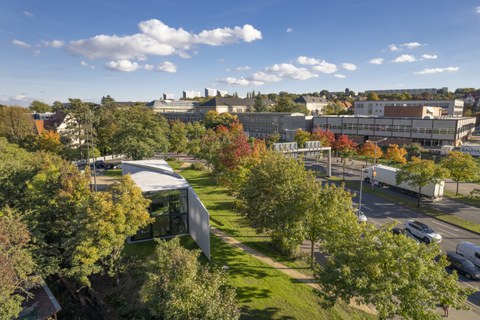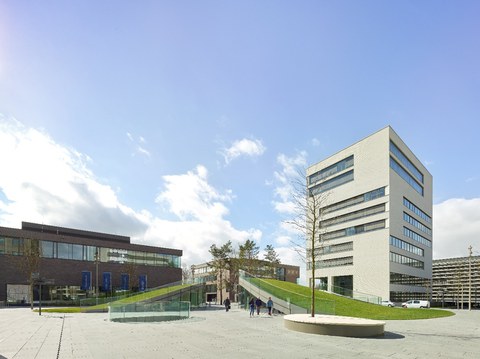Jun 14, 2023
Effectively countering the shortage of skilled workers with AI-based assistance systems without compromising security

TU Dresden Campus
Researchers at TU Dresden and the Ferdinand-Steinbeis-Institut are developing guidelines on how to use AI in small and medium-sized enterprises (SMEs)
Artificial intelligence – the debate surrounding its potential uses and possible dangers is ubiquitous in business and society at the moment. Could this technology hold the answer to the growing skilled labor shortage and the challenges brought about by demographic change? An interdisciplinary team of researchers at TU Dresden (TUD) and the Ferdinand-Steinbeis-Institut are investigating precisely this question in the SKIA project. Over the next two years, they will develop guidelines geared towards SMEs and use case studies to show how AI-based assistance systems can be deployed in SMEs both quickly and effectively, while still maintaining security standards. The project is funded by the Dieter Schwarz Foundation.
When using AI-based methods, modern assistance systems are able to learn about specific tasks and thus support people in completing their work, for example for quality control in assembly processes or for guidance systems in indoor logistics. However, small and medium-sized companies in particular have major reservations about the use of networked assistance systems. One reason for this is uncertainty when it comes to their security. This skepticism is frequently seen in managers and users alike.
At TUD, the CIMTT Center of Production Engineering and Management as well as the Chair of Machine Tools Development and Adaptive Controls are involved in the project. The Dresden researchers from the CIMTT contribute their expertise in the field of work design and work organization. They guide the introduction of data-based assistance systems in SMEs from an occupational science perspective. The researchers at the Chair of Machine Tools Development and Adaptive Controls are developing a practical navigation tool for the introduction of data-based assistance systems with a special focus on cyber security. They are also evaluating AI-supported forms of analysis in a machine context as well as data interaction from sensors to the cloud. They are making use of their partnerships with SMEs from the machine tool industry and assisting specialist production and processing companies from the Dresden-Lusatia region for this purpose.
Prof. Ursula M. Staudinger, Rector of TU Dresden, is delighted with the collaboration, stating, “Ensuring the security of AI-based assistance systems is one of the key challenges of our time. This is why the time is ripe for this project, which is being funded by the Dieter Schwarz Foundation, and it fits perfectly with TUD's research strengths in interdisciplinary digital sciences.”
Reinhold Geilsdörfer, Managing Director of the Dieter Schwarz Foundation, also welcomes the collaboration, adding, “The effective application of artificial intelligence technologies requires networked expertise. We are therefore delighted to support the collaboration between TUD Dresden University of Technology and the Ferdinand-Steinbeis-Institut at the Heilbronn Bildungscampus and thus also to make it easier for companies in the Heilbronn and Lusatia regions to delve into this complex subject area.”
About TUD Dresden University of Technology
TUD Dresden University of Technology is one of the top universities in Germany and Europe, featuring a strong research profile, an outstanding range and quality of degree programs, and close networks with the arts, industry and society. As a modern university with 17 Faculties in 5 Schools, TUD offers a broad academic spectrum that is unique in Germany. It is the largest university in Saxony. The TU Dresden campus community comprises around 30,000 students and 8,500 employees – 600 of whom are professors.
Since 2012, TUD has been one of Germany’s eleven Universities of Excellence. On July 19, 2019, it successfully defended this title.
About the Ferdinand-Steinbeis-Institut

Heilbronn Education Campus
With its interdisciplinary research team and experienced business experts, the Ferdinand-Steinbeis-Institut conducts international research in the fields of digitalization and the transformation of commerce and society. They aim to ensure that their transfer-oriented research projects result in tangible benefits for the regional economy and society. The Ferdinand-Steinbeis-Institut is based at the Bildungscampus in Heilbronn and the Steinbeis-Campus in Stuttgart.
Contact:
TU Dresden
CIMTT Center of Production Engineering and Management
Katharina Hunger
Email:
Telephone: +49 351 463-33597
